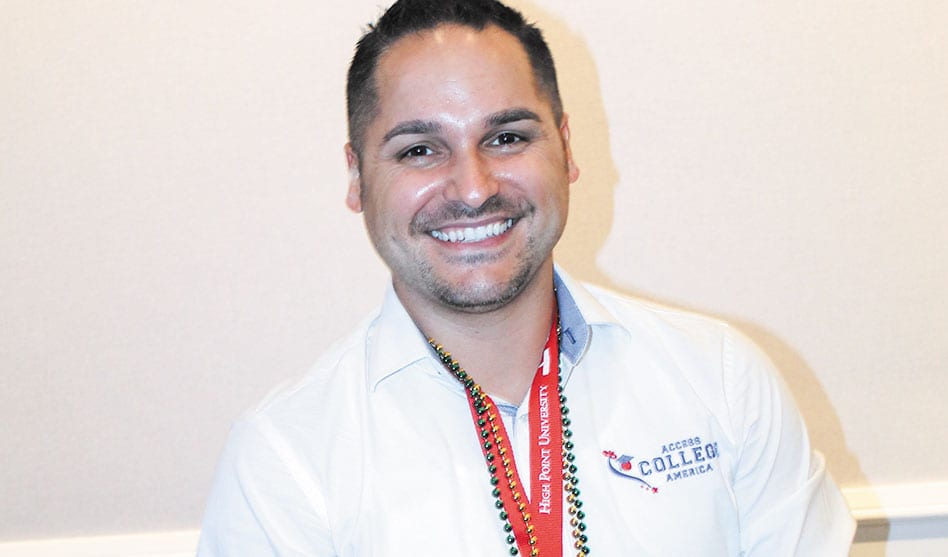Dale Price
Independent education consultant conference includes session on helping LGBT students choose the best college for them
DAVID TAFFET | Senior Staff Writer
taffet@dallasvoice.com
Helping LGBT high school students get into the right college was among the topics discussed at the Higher Education Consultants Association (HECA) conference held in Dallas this week.
HECA has about 1,000 members, explained communications chair Whitney Bruce. She said membership has doubled in the past few years in this fairly new and growing field of independent education consultants.
IECs help students determine their interests, get into the right college and work toward their career goals. Bruce said she works with some students from ninth grade through graduation. Others she helps just during the college application process during their senior year of high school.
“When you’re spending a quarter of a million dollars on college, you should put some thought into it,” Bruce said.
Dale Price, a HECA member, is an independent education consultant who specializes in helping LGBT students make sure their college experience is successful. He said his own experience in high school inspires him to help other LGBT students.
When he was a teenager, Price’s parents threw him out of the house when they learned he was gay. Suddenly, his education wasn’t his main priority. “All I wanted was a stable place to live,” he said.
Despite his homelessness, Price graduated high school and began working. As his life stabilized, he met someone from Baylor who guided him into a program that allowed him to attend community college at no charge and later transfer to University of Texas with financial assistance.
Price said he felt lucky to be at a school like UT that embraced who he was. Not all schools celebrate diversity. Which schools welcome LGBT students may be surprising, he said, noting that not all religious schools should be ruled out, and just because a school is in a liberal city like Los Angeles that doesn’t mean it will be affirming.
One counselor attending Price’s workshop at the HECA convention suggested Loyola in Chicago for LGBT students. Although a Catholic school, it has affirming student groups and supports its LGBT students. On the other hand, Pepperdine, located in L.A. — well, it doesn’t.
And Georgia Tech is among the schools several IECs attending the workshop recommended as best for transgender students. It has a transgender dorm for transitioning students, and although it’s a tech school, it’s looking for creative students who will be innovators. Georgia Tech embraces its LGBT students, IECs at the conference said.
Price said that while the top concern of high school students in general is classes, exams and graduation, those aren’t among the top three issues
LGBT high school students face. Acceptance by their families tops the list of worries among LGBT teens. Next comes bullying, and third is the fear of being outed.
With all those extraneous concerns, many LGBT teens don’t even consider the idea of higher education. They already deal with lots of distractions in the community including drugs and alcohol and a lack of vision and priorities.
Price said he’s had a gay student tell him that he “didn’t have the confidence to go to college.”
Gay/Straight Alliances are one of the best ways to give students confidence and help them make friends, fight bullying and concentrate on their education. But something proven to work is often shut down by school administrations.
One counselor said a friend of hers who tried to start a GSA in her school a number of years ago was asked by her principal, “Is that a good idea, or will it encourage other students to be gay?”
In determining whether a college or university would be a fit for an LGBT student, Price suggested looking at what support is offered by the school, as well as what the school’s policies are. What Pride activities occur on campus? Are there LGBT clubs, resource centers and departments of gender and sexuality studies? Are there majors or minors offered in those fields?
For transgender housing, if nothing appears in the school’s catalog, one counselor suggested calling the housing office to see what its dorm policies are. Does the school have any bathroom policies?
Does the school issue an ID with the trans student’s preferred name and encourage professors to use the preferred name rather than legal name?
The school’s student health plan will give clues to its inclusion of trans students. Some policies cover hormones and transition. Once a student turns 18, some may offer guidance on legal name changes.
Price talked about whether a student should include that they’re LGBT in the application essay. He said there’s not just one correct answer to that: “It’s a personal decision.”
If it’s important to the student and he or she can write about it in a way that would persuade an admissions officer to accept the student, Price said it was fine to include the information. If the inclusion of gender identity or sexual orientation were something that would disqualify a student from admission, that school wasn’t a good match in the first place.
Price suggested that in recommending schools to LGBT teens, counselors need to take into consideration the locale as well as the school’s policies. When a student goes off campus, what’s the experience going to be like? Does the city or state have nondiscrimination policies in place.
How well does the campus reinforce those laws?
Speaking about his profession, Price said, “We change lives.”
But to change those lives and help an LGBT student get a great education, consider the social factors, school’s policies and housing arrangements that will affect the student’s educational experience.


